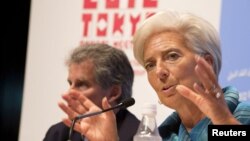TOKYO —
The head of the International Monetary Fund is calling for “courageous and cooperative action” among members to achieve a sustained economic recovery. However, political tensions in Asia and continuing concerns about Europe are drawing the most attention.
IMF Managing Director Christine Lagarde acknowledged “good news and bad news” about the Euro zone, a primary concern for the finance ministers and central bankers here.
The good news, she said, is a new organization - the European Stability Mechanism - that is now functioning. It has nearly $650 billion to provide to troubled Euro zone members. The bad news, Lagarde explained, is that legislative barriers in troubled states hamper them from taking effective action.
Lagarde also dispensed some advice for the world's second-largest economy, China.
“Be a partner in the global economy, full-fledged," she urged. "Second, focus on the domestic market which is clearly an engine for growth that China should activate and is planning to activate. And ,when I say domestic market I would divide between investment and consumption. And, clearly the focus going forward should be on consumption because investment has already been well taken care of in the last couple of years.”
U.S. Treasury Secretary Timothy Geithner explained China's economy has grown more complex over the years and now the shock from Europe has hurt its export-driven growth.
“They just can't sit there and turn these dials, just turn them slightly the way they used to and have that result in significant expansion activity," he noted, "without the risks that they're now a little more worried about, which is not to recreate the distortions, the long costs, of just trying to push a lot of money really quickly through a system that doesn't allocate resources very well.”
But China's finance minister and top bankers are not present to hear this. Beijing has sent lower-ranking officials to show their displeasure with host Japan. The two countries are enmeshed in a diplomatic feud about uninhabited islands controlled by Tokyo but claimed by the Chinese.
Lagarde, a former finance minister of France, chided the Chinese for skipping out, saying they are losing out by not attending important meetings.
For officials from developing countries in attendance, there are worries rising food prices will mean more of their people going hungry.
World Bank President Jim Yong Kim said he is very concerned about this.
“From our perspective the response to the increases in food prices has to be multi-faceted," Kim said. "What we're doing immediately is making resources available to countries to provide an emergency capability of helping to purchase food.”
The World Bank president urged the developed world's ministers and bankers to not only focus on fighting recession in the advanced economies, but also to take steps this week that can help developing nations escape poverty.
IMF Managing Director Christine Lagarde acknowledged “good news and bad news” about the Euro zone, a primary concern for the finance ministers and central bankers here.
The good news, she said, is a new organization - the European Stability Mechanism - that is now functioning. It has nearly $650 billion to provide to troubled Euro zone members. The bad news, Lagarde explained, is that legislative barriers in troubled states hamper them from taking effective action.
Lagarde also dispensed some advice for the world's second-largest economy, China.
“Be a partner in the global economy, full-fledged," she urged. "Second, focus on the domestic market which is clearly an engine for growth that China should activate and is planning to activate. And ,when I say domestic market I would divide between investment and consumption. And, clearly the focus going forward should be on consumption because investment has already been well taken care of in the last couple of years.”
U.S. Treasury Secretary Timothy Geithner explained China's economy has grown more complex over the years and now the shock from Europe has hurt its export-driven growth.
“They just can't sit there and turn these dials, just turn them slightly the way they used to and have that result in significant expansion activity," he noted, "without the risks that they're now a little more worried about, which is not to recreate the distortions, the long costs, of just trying to push a lot of money really quickly through a system that doesn't allocate resources very well.”
But China's finance minister and top bankers are not present to hear this. Beijing has sent lower-ranking officials to show their displeasure with host Japan. The two countries are enmeshed in a diplomatic feud about uninhabited islands controlled by Tokyo but claimed by the Chinese.
Lagarde, a former finance minister of France, chided the Chinese for skipping out, saying they are losing out by not attending important meetings.
For officials from developing countries in attendance, there are worries rising food prices will mean more of their people going hungry.
World Bank President Jim Yong Kim said he is very concerned about this.
“From our perspective the response to the increases in food prices has to be multi-faceted," Kim said. "What we're doing immediately is making resources available to countries to provide an emergency capability of helping to purchase food.”
The World Bank president urged the developed world's ministers and bankers to not only focus on fighting recession in the advanced economies, but also to take steps this week that can help developing nations escape poverty.





